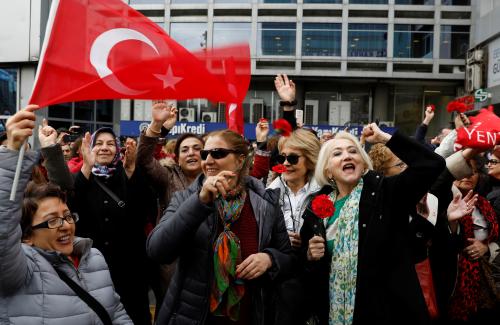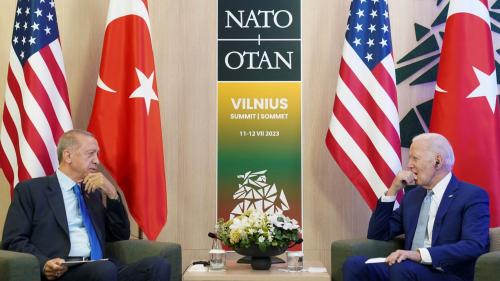On June 24, Turkey will go to early presidential and parliamentary polls. The snap elections come amidst significant macroeconomic turmoil. In May, inflation climbed more than 12 percent on an annual basis, while the Turkish lira has lost almost 20 percent against the dollar and the euro since the start of the year. International analysts such as Moody’s are significantly reconsidering growth rates forecasts. This macroeconomic deterioration follows a general slide in the quality of the country’s economic and political institutions.
As fears persist over the strength of Turkey’s economy, what can be said about how the ruling Justice and Development Party (AKP) has managed public resources since its arrival into power in 2002? Do patterns of government spending reflect development or economic needs or do political priorities largely dictate how budgets are allocated?
In a recent paper, we explore distributive politics under the tenure of the Justice and AKP in Turkey, aiming to assess how the ruling party has deployed public monies toward distinct developmental and political ends. Our results indicate that the AKP in Turkey has systematically allocated public monies to provinces for particular strategic reasons—and not merely to address socioeconomic concerns.
Turkey’s public finances are highly centralized. For example, in 2005, the share of tax revenue of local governments on total tax revenue amounted to 7.6 percent—that is, nearly one-fourth of Spain, half of Mexico, and one-third of the average across OECD countries. This strong centralization of public finances offers Turkey’s national governments a chance to manage and target public resources beyond good governance principles. The AKP has been no exception.
Our results show that the AKP has funneled highly excludable goods (goods that consumers who have not paid for can be prevented from accessing) to strongholds to retain core support while directing non-excludable goods (goods that non-paying consumers cannot be prevented from accessing) to provinces where electoral races were much closer. That is, AKP strongholds were targeted with significantly higher amounts of government expenditure while provinces where vote shares for the AKP were below the party’s national average score have received more locally non-excludable, irreversible goods, such as infrastructure investment. This preferential targeting of excludable and reversible goods, such as current expenditure as well as firm subsidies, to AKP strongholds is evidence of portfolio diversification, in which different budget lines are exploited for distinct strategic objectives. More specifically, reliably pro-AKP districts have been targeted with significantly higher amounts of expenditure in the areas of education—the most important line of current expenditure, which accounts for more than 35 percent of the total—defense and, to a smaller extent, cultural and religious affairs. Our results also point to higher public order and security spending in strongholds of the far-right, notably of the ultra-nationalist Nationalist Movement Part, possibly with the goal of winning the hearts and minds of voters who are ideologically close to the AKP and value order and security.
By contrast, all else equal, provincial strongholds of the main opposition party, the Republican People’s Party (CHP), were the biggest losers, receiving the lowest amount of spending from the central government across the majority of budget subcategories.
Overall, these findings suggest that the dominant party in Turkey has deployed spending strategically. First, the party aims to shore up support among its strongholds in sectors that entail the distribution of more excludable benefits or that potentially facilitate socialization efforts, such as through educational curricula. Second, on net, the party punishes its chief rival, the CHP, by systematically diverting resources away from CHP strongholds. Finally, with respect to the business community, elements of which constitute a core foundation of its support base, the AKP funnels the most excludable types of benefits to areas with more core supporters.
In some sectors, however, the party seems to avoid partisan favoritism and does not establish punishment regimes. In particular, the party appears to have invested relatively equitably in improving the health system, with no evidence of spending discrepancies across districts. Consistent with other accounts (e.g., here, here, and here), it appears that the AKP has preserved the health sector as an arena in which it showcases its commitment to technocratic reforms and development priorities.
Questions about how governments allocate public resources are critical for development. From a policy perspective, our findings suggest that some sectors are less prone to discretionary spending and investment patterns along partisan lines and therefore may function according to a more programmatic logic, giving rise to more equitable improvements in economic and social outcomes. Other sectors, however, may be subject to more partisan logic, with potentially more negative consequences for equitable and sustainable development.
Once portrayed as a successful economic and political model for other countries in the Middle East and North Africa region, Turkey’s president and its government face increasing international scrutiny. Evidence suggests that the AKP incumbents have used central government spending extensively to boost electoral support.








Commentary
Unfair play: Central government spending under Turkey’s AK Party
June 20, 2018